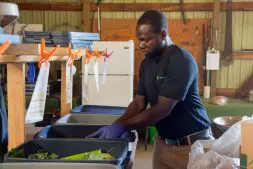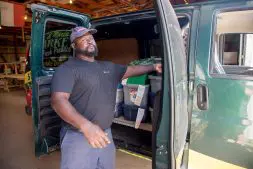COVID-19 And Farm Workers
We’ve had several calls, emails, and social media posts asking about our policy on migrant workers and if you should be concerned with the produce you’re receiving. I’m going to break it down into to separate topics; How do we treat “our” migrant workers and how safe is the product we’re receiving from other local farmers.
How Do We Treat Our Workers?


We have two great guys from Jamaica that work for us, Fabian and Rambo (his real name is Royan, but everyone calls him Rambo, except my 5-year old who calls him Rainbow). Rambo has worked for us for the last four years, and Fabian has worked for us for three years. The guys are in Canada for about 8-months, flying in at the end of March and heading home in November. They live in the farmhouse we grew up in as kids.
At the beginning of April, Rambo and Fabian flew into Canada and quarantined in the farmhouse for 14-days. After they finished quarantine, we sat down together to come up with a strategy for keeping them safe while in Canada. We came up with a plan where they would stay on the farm exclusively. We do all of their grocery shopping, and we’ve provided free internet and a computer for them to do online shopping, banking, and connect with loved ones back home in Jamaica. They voluntarily haven’t left the farm since entering Canada.
How Safe Is Our Produce?
As a company, we decided years ago that we would support farmers we know and trust over purchasing the cheapest vegetables we can find. We feel it’s one of the decisions that set us apart from the other fruits and vegetables you are used to. You get the best because our partners give us the best. It also means we purchase almost exclusively from smaller farms.
Throughout the outbreak, we’ve been in constant communication with our farmers to ensure their workforce is COVID-19 free. The only close call happened back in early April. We had one batch of mushrooms from Highline Mushroom come in during an outbreak there. We disposed of those mushrooms before they made it into the delivery service and switched to a farm outside of the region until cleared. We also sent out an email to all of our members, notifying them of the scare and steps we took to resolve it.
It would be easier for us if the health unit would identify farms where an outbreak is happening, but we trust the people we deal with and are confident our produce is safe.
Anything Else?
Ya, one more thing. The discussion around migrant workers is always a hot topic. It’s a complex issue blending extremely important topics like human rights, immigration, access to food and food safety. Workers from other countries are vital to area farms. There is also no excuse for mistreatment. Here are answers to questions we get all the time:
Why Not Just Hire Locally? When we began delivering to homes 8 years ago, we had a plan to rely entirely on local help. For four years we tried to hire help to work in our fields or pack bins and over the entire time, we were never able to get people to work. We once held a day of interviews, set to speak with 8 confirmed candidates, and not a single person showed up. We had to move to migrant workers to get the job done.
How Much Do You Save Hiring Migrant Workers? Contrary to popular belief, migrant workers are entitled to all of the protections under provincial employment standards. That said, the Ontario Employment Standards Act does include exemptions for farmworkers, whether you are a Canadian citizen or from somewhere else. You can find a full list of those exemptions at this site. At Lee & Maria’s, our workers are paid above the minimum wage. We are also legally required to provide housing, transportation, and pay for their flights in and out of the country. Rambo and Fabian pay back a portion of these costs over time through their paycheques. Overall, migrant workers end up costing more than it would be hiring locally.
What Checks And Balances Are In Place For Their Safety? Any location that is approved for housing migrant workers, including our farmhouse, is inspected each year by the Windsor and Essex County Health Unit and must meet specific guidelines. We personally go above these guidelines, but it is a decision we make and not a requirement. For Jamaican workers specifically, there is also a government office in Leamington called the Jamaican Liason Office. It is staffed by Jamaican government employees who frequently visit farms like ours and are available to workers. A similar office is in place for Mexican workers, but we don’t have experience with them.
Have Your Workers Been Tested? We treat Rambo and Fabian no differently than any other employees who work in our market or delivery service. We don’t require anyone to be tested to work for us. That said, anyone who shows any symptoms related to COVID-19 is required to be tested before returning to work. Staff have voluntarily gone for testing and they have tested negative. If the health unit provides on-farm testing for small farms we would offer it to all of our employees, including those who weren’t born in Canada.
The goal of this post is to show what we’re doing, the policies we’ve put in place, and answer a few of the questions we’ve been asked. We know there are several other farms in the region doing the exact same things we are and we applaud their hard work in keeping their workers safe.
If you have any other questions we haven’t covered, feel free to give us a call at 519-733-9328. We’re more than happy to answer any questions you have regarding our practices and policies.
